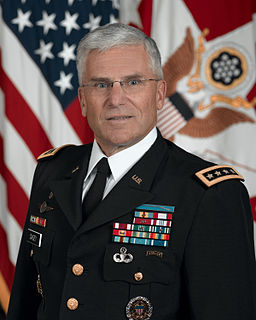A Quote by Paul Wolfowitz
It's hard to conceive that it would take more forces to provide stability in post-Saddam Iraq than it would take to conduct the war itself and secure the surrender of Saddam's security forces and his army. Hard to imagine.
Related Quotes
There has been a good deal of comment — some of it quite outlandish — about what our postwar requirements might be in Iraq. Some of the higher end predictions we have been hearing recently, such as the notion that it will take several hundred thousand U.S. troops to provide stability in post- Iraq, are wildly off the mark. It is hard to conceive that it would take more forces to provide stability in post-Saddam Iraq than it would take to conduct the war itself and to secure the surrender of Saddam's security forces and his army — hard to imagine.
I think what history will show is that one of the most tragic results of the war in Iraq will be that although Sharon, the Likudites, the Neoconservatives in our country, President Bush and the Democratic party thought the war in Iraq and destroying Saddam would benefit Israeli security, we're seeing absolutely that the war in Iraq has probably put Israeli security in a more tenuous condition than it's been in since the founding of the Israeli state.
For the last eight years, American policy toward Iraq has been based on the direct threat Saddam poses to international security. That threat is clear. Saddam's history of aggression leaves little doubt that he would resume his drive for regional domination and his quest for weapons of mass destruction if he had the chance.
The authorization I propose would provide the flexibility to conduct ground combat operations in other more limited circumstances, such as rescue operations involving U.S. or coalition personnel or the use of special operations forces to take military action against ISIL leadership, it would also authorize the use of U.S. forces in situations where ground combat operations are not expected or intended, such as intelligence collection and sharing, missions to enable kinetic strikes or the provision of operational planning and other forms of advice and assistance to partner forces.
With overwhelming military strength now deployed against him and with intense monitoring from space surveillance and the U.N. inspection team on the ground, any belligerent move by Saddam against a neighbor would be suicidal....If Iraq does possess such concealed weapons, as is quite likely, Saddam would use them only in the most extreme circumstances, in the face of an invasion of Iraq, when all hope of avoiding the destruction of his regime is lost.
One of the real costs of the war is that our security is actually less than it otherwise would have been - ironic, since enhancing security was one of the reasons for going to war. Our armed forces have been depleted - we have been wearing out equipment and using up munitions faster than we have been replacing them; the armed forces face difficult problems in recruitment -by any objective measures,including those used by the armed forces, quality has deteriorated significantly.
If Saddam's regime and survival are threatened [by invasion], he will have nothing to lose, and may use everything at his disposal... If weapons of mass destruction land on Israeli soil, killing innocent civilians, the experts I have consulted believe Israel will retaliate, and possibly with nuclear weapons... Nor can we rule out the possibility that Saddam would assault American forces with chemical or biological weapons.
Saddam's existing biological and chemical weapons capabilities pose a very real threat to America, now. Saddam has used chemical weapons before, both against Iraq's enemies and against his own people. He is working to develop delivery systems like missiles and unmanned aerial vehicles that could bring these deadly weapons against U.S. forces and U.S. facilities in the Middle East.



































